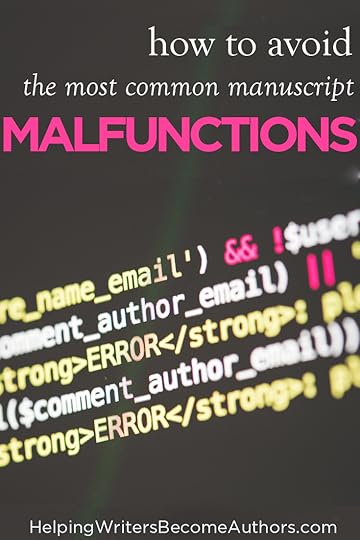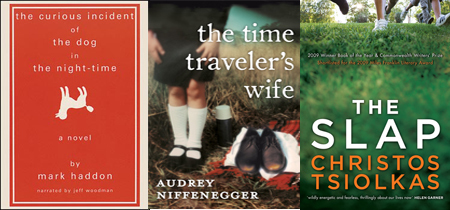The Most Common Manuscript Malfunctions (and How to Avoid Them)
 Editors see hundreds of manuscripts every year, from new and veteran writers alike. Almost all of them fall down on the same points. To help you avoid the common pitfalls of fiction writing, here are the manuscript malfunctions editors see most often, with tips on how you can avoid them!
Editors see hundreds of manuscripts every year, from new and veteran writers alike. Almost all of them fall down on the same points. To help you avoid the common pitfalls of fiction writing, here are the manuscript malfunctions editors see most often, with tips on how you can avoid them!
Manuscript Malfunction #1: Clichés
Clichés are at top of the list because they’re the easiest manuscript malfunction to commit. You use clichés every day without realizing it, whether you’re describing “falling head over heels” in love with someone or asking your kids if they think you’re “made of money.” Unfortunately, clichés can turn even the most exciting scene into dull prose.
How to Avoid This Manuscript Malfunction
Clichés are most often found in your descriptions. When copy editing your work, take a close look at your similes, metaphors and adverbs. If you think you might’ve read them somewhere before, change it up. Turn “eyes as blue as the sky” into “eyes the color of crushed cornflowers.” Not only does this make your writing more interesting, it also creates a vivid picture for your reader.
Manuscript Malfunction #2: Overwriting
Why say something in fifty words when you could say it in ten? Brevity increases clarity, as well as quickening pace and make startling images “pop.”
How to Avoid This Manuscript Malfunction
Read this out loud:
She looked left and right down the path, but as she saw no one coming, she hurried quickly into the forest. The darkness cast by the trees immediately swallowed her, and seemed to wrap itself around her neck, force its way into her lungs. As she ran, she choked on it.
Right. Now try this much shorter version.
She hurried into the forest. The darkness wrapped itself around her neck, forcing its way into her lungs. As she ran, she choked.
Better, right? Try reading your work out loud, then taking out a red pen and deleting all the unnecessary words.
Manuscript Malfunction #3: Double Adjectives
With great adjectives come great responsibility. Don’t dilute your existing adjectives by adding still more. For example:
He sat on the hard frozen ground and felt sharp spikes of grass poke through his black leather gloves.
Way too many adjectives in this sentence. Even removing just one from each pair makes it easier to read:
He sat on the frozen ground and felt spikes of grass poke through his leather gloves.
Or, even better still, turn your adjective into a verb for an extra punch:
He sat on the frozen ground; the grass spiked through his gloves.
How to Avoid This Manuscript Malfunction
Some writers work best on paper. Printing your manuscript is a great way to gain a new perspective and makes spotting this kind of malfunction easier.
Manuscript Malfunction #4: Soggy Speech
Dialogue is difficult to get right. Make it too real, and your scene will get bogged down with “um’s” and “er’s” that don’t add anything to the scene. Go the other way however, and your characters become wooden.
How to Avoid This Manuscript Malfunction
Use a mixture of speech and indirect action to get your point across. And—just like in the points above—if it doesn’t need to be there, cut it out. You can find an in-depth look at the pitfalls of dialogue and how to fix them, here.
Manuscript Malfunction #5: No Unique Selling Point
This is a big one, as it refers to the book as a whole, rather than things easily remedied by a copy edit. Unfortunately, it’s also one of the most common reasons for a book being rejected by a publisher. Your book might be well-written, warm, and even exciting, but if it doesn’t offer anything unusual a publisher can use to “hook” readers, then it’s going to struggle to find a place.
How to Avoid This Manuscript Malfunction
In the first instance, write a book that’s unusual. This might be an unusual narrator (like The Curious Incident of the Dog in the Night-Time), a unique concept (like in The Time Traveler’s Wife), or even a contentious subject (The Slap). If you’ve already written your book, but aren’t sure what your “hook” is—give it to a friend to read and then ask her to tell you what it’s about. What’s the first thing she says? If it isn’t clear, you might want to rethink your concept.

Fortunately, everything in this list is easily fixed (yes, even #5!). By making these edits yourself, you can save a lot of time and money later down the line when you come to hiring an editor or agent. Good luck!
Wordplayers, tell me your opinion! Have you ever had to deal with any of these common manuscript malfunctions in your story? Which one? Tell me in the comments!
The post The Most Common Manuscript Malfunctions (and How to Avoid Them) appeared first on Helping Writers Become Authors.



